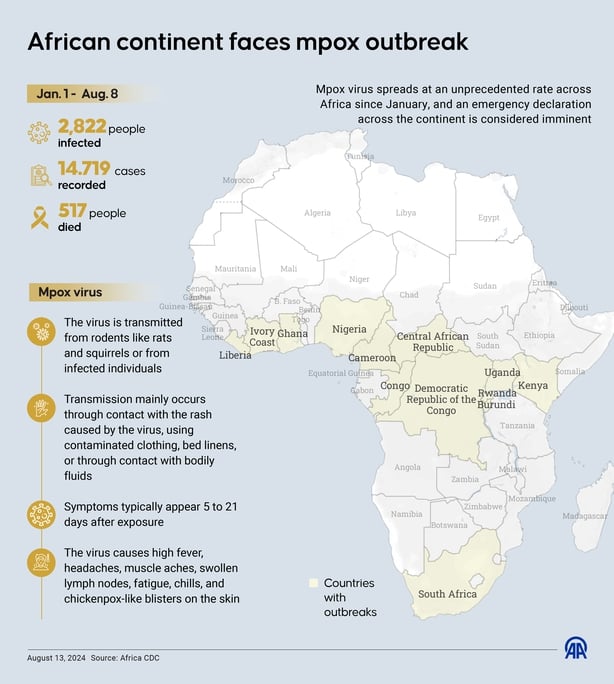Posted on over 1 year ago by Laurentina Kennedy

WHO declares mpox a global public health emergency

The World Health Organization (WHO) has declared the mpox surge in Africa a global public health emergency, sounding its highest possible alarm over the worsening situation.
An emergency committee met to advise WHO Director-General Tedros Adhanom Ghebreyesus on whether the disease outbreak constitutes a "public health emergency of international concern," or PHEIC.
PHEIC status is WHO's highest level of alert and can accelerate research, funding and international public health measures and cooperation to contain a disease.
"It's clear that a coordinated international response is essential to stop these outbreaks and save lives," said Dr Tedros.
The gathering of 16 international figures comes after the African Union's health watchdog declared its own public health emergency over the growing outbreak.
The outbreak in Democratic Republic of Congo began with the spread of an endemic strain, known as clade I.
We need your consent to load this comcast-player content We use comcast-player to manage extra content that can set cookies on your device and collect data about your activity. Please review their details and accept them to load the content. Manage Preferences
But a new variant, clade Ib, appears to spread more easily through routine close contact, including sexual contact.
It has spread from DR Congo to neighbouring countries, including Burundi, Kenya, Rwanda and Uganda, triggering the action from the WHO.
WHO chief Tedros Adhanom Ghebreyesus said the more than 14,000 cases and 524 deaths reported so far this year in DR Congo has already exceeded last year's total.
"The detection and rapid spread of a new clade of mpox in eastern DRC, its detection in neighbouring countries that had not previously reported mpox, and the potential for further spread within Africa and beyond is very worrying," Dr Tedros added.
"In the past month, about 90 cases of clade 1b have been reported in four countries neighbouring the DRC that have not reported mpox before: Burundi, Kenya, Rwanda and Uganda.

"But we are not dealing with one outbreak of one clade: we are dealing with several outbreaks of different clades in different countries with different modes of transmission and different levels of risk," Dr Tedros said.
Dr Tedros said that WHO had released $1.5 million in contingency funds and plans to release more in the coming days.
WHO's response plan would require an initial $15 million, and the agency plans to appeal to donors for funding.
The committee advised Dr Tedros that the outbreak represents a public health emergency of international concern (PHEIC) - the highest alarm the WHO can sound.
A PHEIC declaration then triggers emergency responses in countries worldwide under the legally binding International Health Regulations.
It is the second PHEIC in succession on mpox - albeit one focused on a different, and more deadly, strain of the virus.
In May 2022, mpox infections surged worldwide, mostly affecting gay and bisexual men, due to the Clade 2b subclade.
The WHO declared a public health emergency which lasted from July 2022 to May 2023. The outbreak, which has now largely subsided, caused some 140 deaths out of around 90,000 cases.
The clade 1b subclade, which has been surging in the DRC since September 2023, causes more severe disease than clade 2b, with a higher fatality rate.
Mpox is an infectious disease caused by a virus transmitted to humans by infected animals but can also be passed from human to human through close physical contact.
The disease causes fever, muscular aches and large boil-like skin lesions.
Two vaccines for mpox are recommended by WHO immunisation experts.
A PHEIC has only been declared seven times since 2009: over H1N1 swine flu, poliovirus, Ebola, Zika virus, Ebola again, Covid-19 and mpox.